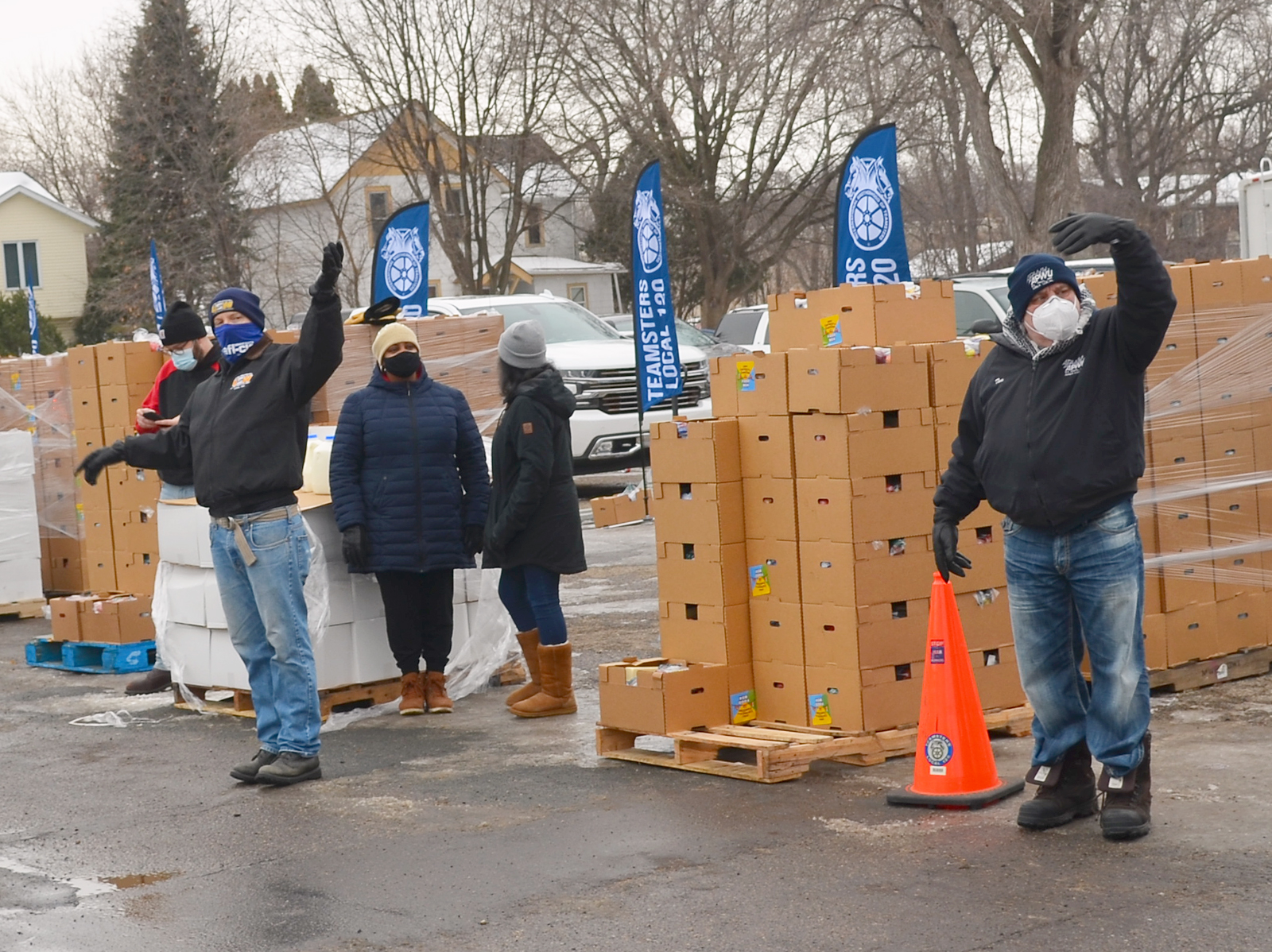

Share
Local unions are stepping up this winter to connect thousands of Minnesotans with free, fresh food available through the U.S. Department of Agriculture’s Farmers to Families Food Box program.
The St. Paul Regional Labor Federation, which brings together over 100 local unions in Chisago, Dakota, Ramsey and Washington counties, is spearheading the effort, working in partnership with local unions and labor councils to plan and stage distribution events outside union halls and training centers – and even blocks away from a picket line.
The distribution events are open to all, and with food-shelf visits at an all-time high in Minnesota, they are drawing a lot of interest.
Unions like Local 110 of the International Brotherhood of Electrical Workers (IBEW) are eager to help meet the growing need for food, Business Manager Jamie McNamara said. The union hosted a distribution event at its facility on Conway Street Feb. 20, one of 12 organized by the Regional Labor Federation and its partners last month.
“We’re extremely honored to be able to provide food to the East Side of St. Paul,” McNamara said. “The IBEW has a great partnership with the community here, and we’re very grateful to be of service to a community that’s been so good to us. We look forward to doing another one of these in the future.”

Union volunteers are eager to support food distribution events like this one at IBEW Local 110.
Each distribution site that participates in the Farmers to Families program receives a truckload of around 1,300 food packages. Each package contains 25 to 30 pounds of fresh fruits, vegetables and meat and dairy products, including a gallon of milk.
The events are opportunity to restock the refrigerator, whereas food pantries mostly offer non-perishable, shelf-stable goods.
Erica Dalager Reed, an AFL-CIO Community Services liaison with the Regional Labor Federation, said the fresh food boxes help families struggling with food insecurity to “supplement what they are getting from other resources,” like food shelves.
But offering fresh food comes with unique challenges for Dalager Reed and the federation’s partner organizations.
Timing is everything. When a truck arrives at a distribution site, volunteers must be ready to unload and sort the food for contactless pickup. Distribution must begin – and end – shortly after the food leaves the truck to prevent it from spoiling.
It’s a labor-intensive process, which makes unions uniquely qualified for the job. And through their training centers and industry connections, unions can usually access a pallet jack or forklift to unload the trailer, too.
“When we first hosted a food distribution site at the Labor Center last October, it gave us a real sense of the need that exists in our community,” Regional Labor Federation President Kera Peterson said. “Since then, our affiliate unions and volunteers have given their time and talents generously at event after event, outside and in the cold. I am deeply appreciative.”

The Regional Labor Federation’s nonprofit arm, the St. Paul Labor Studies and Resource Center, plays a key role in accessing the USDA program, which allows only registered nonprofit organizations to arrange for delivery of a Farmers to Families truckload.
The program has been so popular that union groups statewide – and even in North Dakota – have reached out to Dalager Reed about setting up distribution events in partnership with the St. Paul federation and the LSRC.
“We’re just looking to help the community,” Tony Poole, business manager of St. Paul Pipefitters Local 455, said during an event Feb. 16 at the union’s training center in the North End. “We’ve got a lot of low-income families around this neighborhood, and we just want to help. It worked out really well.”
Officers, staff and volunteers from Pipefitters Local 455 pause for a photo during a food distribution event at their North End facility.
It’s gone over well with the public, too.
Dalager Reed said she saw several comments on social media after the Pipefitters’ event, with some users thanking the union and others expressing surprise. One person, she said, wrote: ‘That’s my dad’s union! I didn’t know unions did stuff like that.’”

St. Paul Building Trades Executive Secretary Don Mullin, whose council co-hosted a distribution event Feb. 3 at the St. Paul Labor Center, said that while unions and union members have a long history of giving back to their communities, they aren’t always good at taking credit for it.
“This has been a great opportunity to provide meals to the community, and it really speaks to everything labor does as a whole,” Mullin said. “We help out. We work with the community. And we’re showing the community what we’re all about.”

